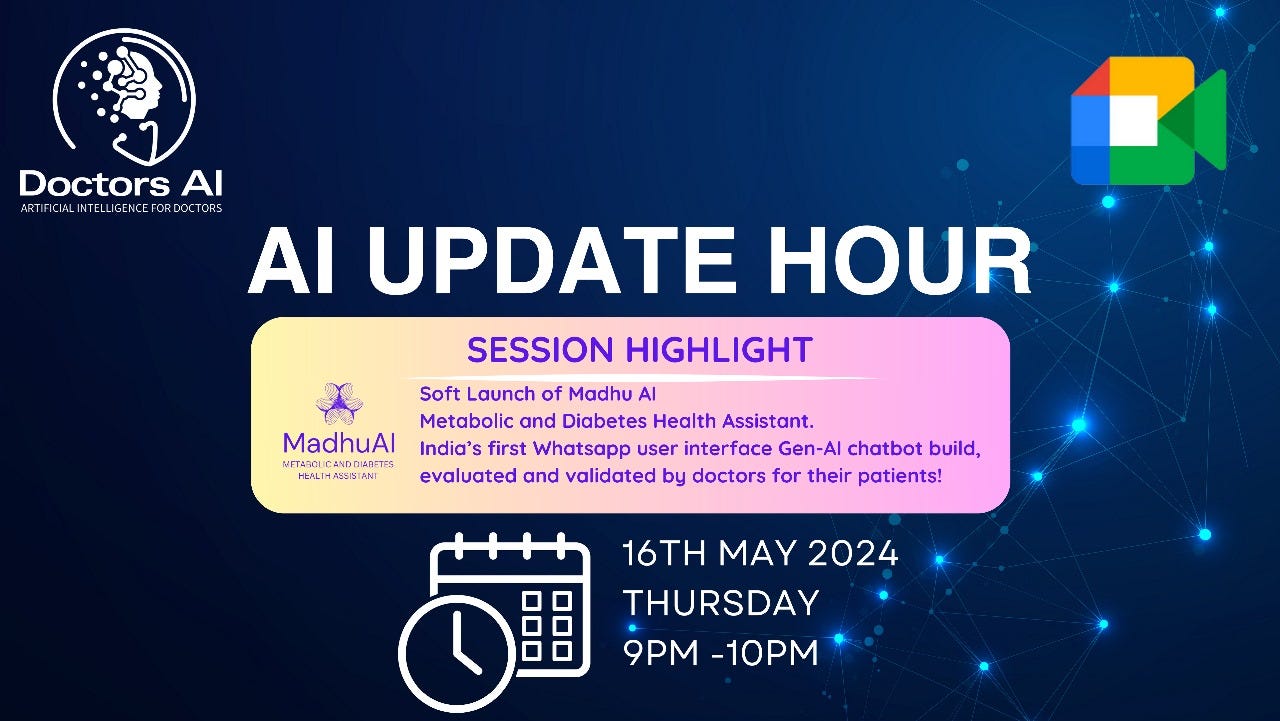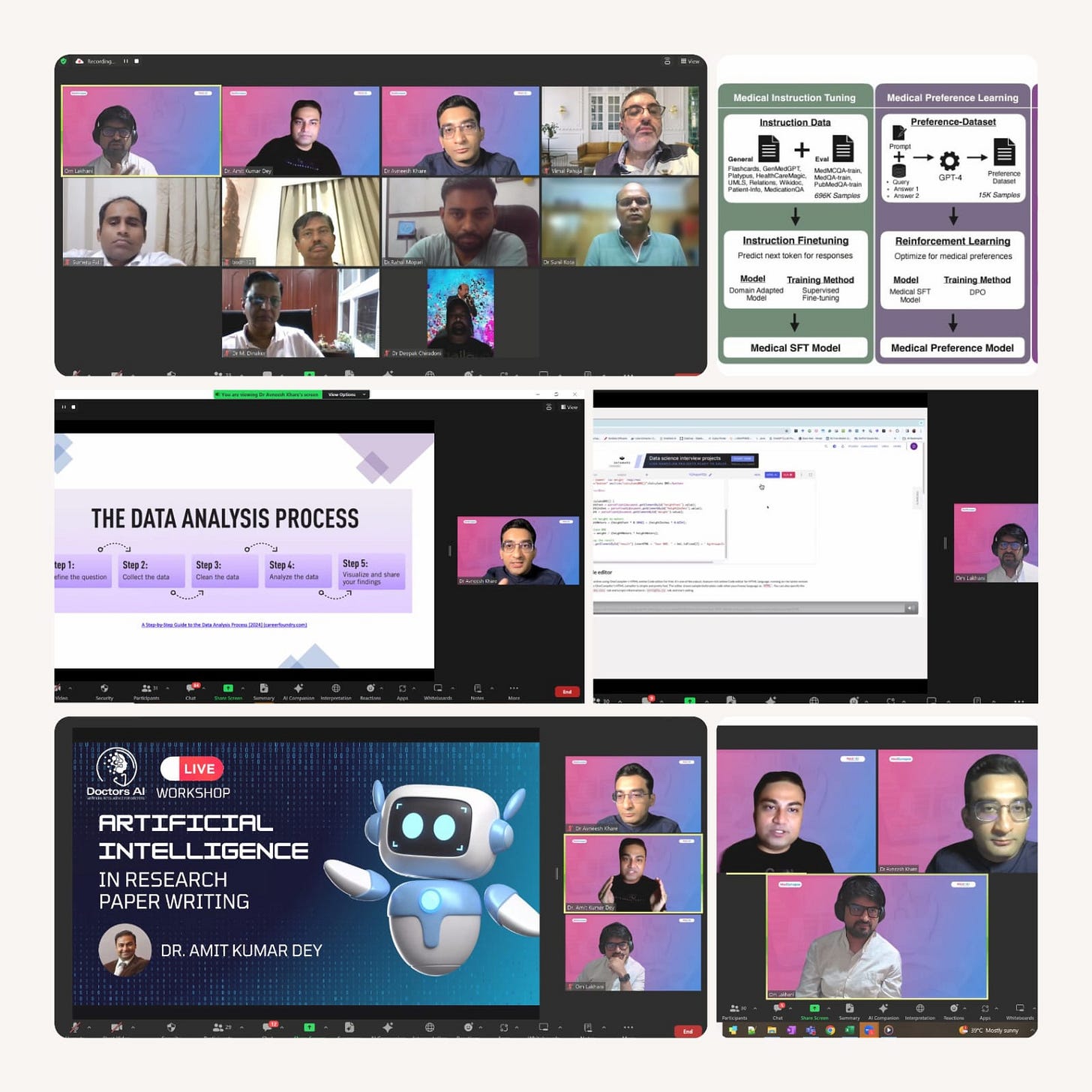⚡ From AI-Enhanced Radiology to Early Alzheimer's Detection & More: This Week's Med AI Innovations Inside! 🚀
Updates on Artificial Intelligence & Emerging Technologies in Medicine 🤖🩺
“The greatest opportunity offered by AI is not reducing errors or workloads, or even curing cancer: it is the opportunity to restore the precious and time-honored connection and trust—the human touch—between patients and doctors. Not only would we have more time to come together, enabling far deeper communication and compassion, but also we would be able to revamp how we select and train doctors.” ― Eric Topol, Deep Medicine: How Artificial Intelligence Can Make Healthcare Human Again
Dear Med AI Enthusiast,
Welcome to The ‘Med AI’ Capsule weekly newsletter, your inside look at how artificial intelligence and emerging technologies are transforming medicine.⚕
Whether you're a medical professional 👩⚕️, a technology enthusiast 💻, or simply someone with a curious mind 🧠, The 'Med AI' Capsule is designed for you.
It helps you stay informed 📰 about the latest groundbreaking updates and offers insights into the rapidly evolving world 🌍 of artificial intelligence and emerging technologies in medicine.
Let the adventure begin! I'm thrilled to have you along for the ride. 🚀
In today’s capsule:
5 News Updates
4 Latest Research Papers
3 Industry Innovators
2 Upcoming Events
1 Knowledge Resource
Reading Time: 5-7 minutes
News Updates 📰
1. 🖥️ FDA Authorizes 120+ New AI-Enabled Radiology Devices
The U.S. Food and Drug Administration has updated its list of authorized AI and machine learning-enabled medical devices, significantly enhancing radiology diagnostics, with notable companies such as Siemens Medical Solutions, GE, Philips, Canon, Viz.ai, Butterfly Network, Lunit, and Aidoc Medical featured on the list.
Why Important: The FDA's recent update reflects the growing impact of AI in medical imaging and advancing the precision and efficiency of radiological diagnostics, potentially enhancing patient outcomes through earlier and more accurate detection of medical conditions.
Caution: Despite FDA authorization, insurance coverage remains a significant barrier, with the Centers for Medicare & Medicaid Services (CMS) currently covering only around 10 of these AI devices, prompting medical organizations and advocacy groups to actively lobby for broader coverage to ensure these innovative tools are accessible to healthcare providers and patients.
2. 🤝 Moderna Teams Up with OpenAI to Transform mRNA Drug Development with AI
Moderna has announced a groundbreaking partnership with OpenAI, the company behind ChatGPT, to enhance its mRNA drug development and manufacturing operations through generative AI.
Why Important: This collaboration aims to integrate AI across all facets of Moderna's operations, driving innovation and efficiency to launch 15 new products in the next five years with its existing workforce, transforming processes in science, legal, and manufacturing sectors, and potentially accelerating the development of non-COVID mRNA vaccines.
“Just as the introduction of the personal computer in the 1980s changed the way we work and live, AI is on a path to completely transform our everyday lives — and OpenAI is helping to lead the way.” - Stéphane Bancel, Moderna CEO
Caution: While AI integration promises significant advancements, careful oversight and continuous evaluation are crucial to ensure high standards of security, privacy, and efficacy, particularly in sensitive areas like clinical research and vaccine development.
3. 🧠 AI Breakthrough at IIT Indore Enables Early Alzheimer's Diagnosis
A recent study by the Indian Institute of Technology, Indore, utilized advanced AI methods to significantly advance the understanding and diagnosis of Alzheimer's disease.
Why Important: The study highlights the use of ensemble deep learning models to improve the precision and reliability of Alzheimer's diagnosis, offering a transformative advancement in medical diagnostics through the integration of neuroimaging and genetic data, crucial for effective early intervention and treatment planning to enhance patients' quality of life.
Caution: While AI holds immense potential for diagnosing Alzheimer's, rigorous testing, validation, ongoing research, and multidisciplinary collaboration are essential to address challenges and optimize its application in medical settings.
4. ⌚ Samsung Exploring AI for Atrial Fibrillation Monitoring in Upcoming Galaxy Watch
Samsung is reportedly developing a feature using AI to monitor for atrial fibrillation (AFib), which might debut in the upcoming Galaxy Watch 7.
Why Important: AFib is a serious condition causing irregular and rapid heartbeats, leading to over 400,000 hospitalizations annually in the US; Samsung's potential AI-powered feature could translate photoplethysmograph (PPG) signals into ECG signals, offering more accurate AFib detection than current methods and enhancing the Galaxy Watch's health monitoring capabilities for early diagnosis and prevention.
Caution: While promising, integrating AI in health monitoring devices requires rigorous testing and validation to ensure accuracy and reliability in real-world applications.
5. 🌍 AI-Driven Medical Screening to Reach One Million People in Vietnam
A volunteer program, organized by the Central Committee of the Vietnam Youth Federation (VYF) and the Vietnam Young Physicians' Association (VYPA), aims to screen one million people for diseases using an AI platform.
Why Important: This initiative will leverage AI technology to enhance the efficiency and reach of medical screenings, providing consultations and check-ups to 100,000 individuals while engaging 20,000 young doctors.
Caution: Ensuring the accuracy and reliability of AI-driven screenings will be crucial, requiring continuous monitoring and evaluation to maintain the program's effectiveness and address potential challenges in reaching remote or underserved populations.
Latest Research Papers 🔬
Comparative Evaluation of LLMs in Clinical Oncology - evaluated the performance of five large language models in clinical oncology, finding GPT-4 to have the highest accuracy among them, though all models exhibited clinically significant errors.
Examining the Efficacy of Extended Reality–Enhanced Behavioral Activation for Adults With Major Depressive Disorder: Randomized Controlled Trial - found that extended reality-enhanced behavioral activation (XR-BA) is a feasible, acceptable, and noninferior alternative to traditional behavioral activation in reducing depressive symptoms in adults with major depressive disorder, suggesting that XR can be an effective tool in mental health treatment.
A systematic review and meta-analysis of artificial intelligence versus clinicians for skin cancer diagnosis - found that AI algorithms generally outperform generalists and non-expert dermatologists in skin cancer diagnosis, performing comparably to expert dermatologists, while highlighting the need for more prospective, real-world studies and AI assistance integration.
The application of large language models in medicine: A scoping review - systematically reviewed the application of large language models (LLMs) in medicine, highlighting their transformative impact on diagnostics, medical writing, education, and project management, while emphasizing the need for ethical integration and empirical validation in clinical settings.
Industry Innovators 👨🏭
AiCure - a clinical trial management platform utilizing AI to enhance drug development by improving medication adherence, patient engagement, and treatment response prediction using digital biomarkers. Their solutions support traditional, decentralized, and hybrid trials, providing comprehensive data to ensure clinical trials achieve statistical power and capture meaningful outcomes. AiCure's services reduce the technical burden on clinical sites, allowing for increased focus on patient care.
Doximity - a professional network for U.S. healthcare professionals, facilitating secure communication, collaboration, and information sharing among physicians, nurse practitioners, and other medical practitioners. It offers tools like HIPAA-compliant messaging, telehealth services, and personalized news updates to enhance clinical practice and professional development. With over 80% of U.S. physicians as members, Doximity is a key platform for healthcare professionals to connect and stay informed.
Freenome - a biotechnology company focused on early cancer detection through multiomics and advanced machine learning. By analyzing blood samples, Freenome aims to identify cancer-related biomarkers and provide actionable insights for early intervention. Their comprehensive approach integrates genomics, proteomics, and immunomics to improve the accuracy of early cancer diagnosis and enhance patient outcomes.
Upcoming Events 🧑💻
First of its kind, once a month, open forum for all members of Doctors AI community to brainstorm thoughts and visions on AI in healthcare.
Doctors AI conducted a highly intense 🧠 6-hour marathon hands-on AI training session on a Sunday afternoon/ evening, with 35+ engaging medical professionals joining from all over India and abroad!
AI literacy is key to the rapid adoption of this ever-changing landscape in healthcare, and it was heartwarming to witness such highly interactive participation from everyone who joined.
If you missed out on this one, we’ll be coming up with another workshop! Dates to be announced soon!
Knowledge Resource 📚
BrainX Community Live! Spring 2024 : 2023 Year in Review and VALID AI
This video discusses the developments in artificial intelligence in healthcare for the year 2023, specifically focusing on a review by the BrainX Research team and a segment on VALID AI, an execution accelerator for generative AI in healthcare.
Key takeaways include the sustained growth and impact of AI applications within healthcare specialties, with a significant focus on actionable insights that directly influence patient care. The session highlights the development of VALID AI, a tool designed to improve the evaluation and execution of generative AI in healthcare.
The community's active engagement and collaboration through resources like webinars, publications, and a strong online presence, facilitate ongoing learning and sharing of innovative AI applications. The year 2023 saw a notable increase in AI-related publications, indicating robust research activities and a commitment to exploring AI's potential to enhance healthcare outcomes.
Let’s wrap it up with a poll! 📊
Your feedback is crucial to me, as it helps me understand your interests and improve my offerings. I would appreciate it if you could take a few minutes to share your thoughts about what you've enjoyed and what you think I could do better.
Stay tuned for our upcoming editions as we explore the latest breakthroughs and dive deep into the transformative power of artificial intelligence and emerging technologies, shaping a healthier future. 🚀
Warm regards,







